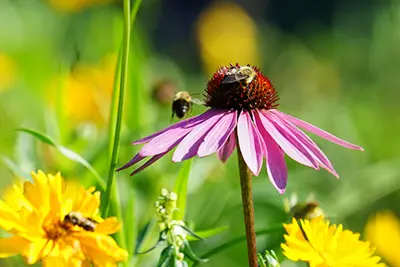Students Gain Sustainability Knowledge Through Courses, Experiences
 Image by Ed Brennen
Image by Ed Brennen
03/10/2023
By Brooke Coupal
When sophomore plastics engineering major Abby Mastromonaco applies for jobs after graduating, she will be better able to highlight her sustainability knowledge to employers, thanks to a new River Hawk Experience Distinction (RHED) offering.
The RHED program, which launched in 2017, pairs preapproved courses with experiences outside the classroom, giving students the opportunity to earn a special distinction on their transcript. The distinctions can be in leadership, entrepreneurship, global engagement, community engagement and, as of January 2023, sustainability.
“It’s really important that future employers see how passionate I am about sustainability,” says Mastromonaco, the first student to sign up for the sustainability distinction in RHED. “The distinction is going to set me apart.”
Experiential Learning & Cooperative Education Director Rae Perry oversees the RHED program and says now is the perfect time to introduce the new distinction.
“We are seeing much more student interest in sustainability,” she says. “It’s a value that many of them embrace.”
For Wendy Hyatt, assistant director of experiential learning and signature programs, the beauty of the sustainability distinction is that it’s interdisciplinary.
“Sustainability doesn’t belong in just one area,” she says. “Every major can have a way to pursue interests in sustainability.”
Students looking to complete the sustainability distinction must take two preapproved courses, such as Writing about the Environment or Introduction to Polymer Sustainability. The preapproved list is growing as UMass Lowell welcomes more sustainability-related academic programs across campus, including the Political Science Sustainability and Environmental Politics concentration and the Environmental Science Sustainability option.
“As UMass Lowell becomes more known for its sustainability, it’s awesome having all these programs launching at the same time,” says Lori Weeden, an associate teaching professor in the Department of Environmental, Earth and Atmospheric Sciences who helped establish the RHED in sustainability.
 Image by Ed Brennen
Image by Ed Brennen
The wide range of available programs and courses lets students branch outside of their degree pathways and explore sustainability in different disciplines. Mastromonaco’s course load focuses on plastics engineering, but with the RHED program, she is considering taking Introduction to Environmental Economics.
“The class will allow me to get a different area of exposure,” she says.
In addition to taking two courses, students must complete two sustainability-related experiences. For Mastromonaco’s first experience, she is helping Raytheon Technologies with its sustainability initiatives, one of which includes spreading awareness via a video campaign about how simple tasks like shutting off lights and unplugging computers can save energy.
“It will show how even one person can make a difference in a company that’s as large as Raytheon,” says Mastromonaco, who is doing a six-month co-op at the company’s Andover, Massachusetts, location.
Other experiences that count for the RHED in sustainability include serving as a UML student observer at the United Nations Conference of the Parties, winning a Rist Institute Climate Mitigation prize, receiving a Sustainability Engagement and Enrichment Development grant, volunteering for local sustainability organizations, working with the Office of Sustainability on greenhouse and green roof projects, and running the climate simulator En-ROADS for a school group or civic organization.
Students can also propose different experiences to a committee of faculty and staff for approval, allowing for flexibility that Paula Haines, senior director of curriculum assessment and accreditation, says is beneficial for students.
“Not every student thinking about sustainability has the same set of concerns or the same emphasis,” she says. “The program has the flexibility to meet students’ interests.”
Students are required to write a reflection piece for each course and experience that they finish for the RHED program. Through these reflections, the students will learn the best ways to articulate how the program has expanded their sustainability knowledge.
“The RHED program gives our students an edge,” Hyatt says. “This is a powerful avenue for students to marry a personal interest with their academics in a credentialed way, and they can present their knowledge to employers when they graduate.”




